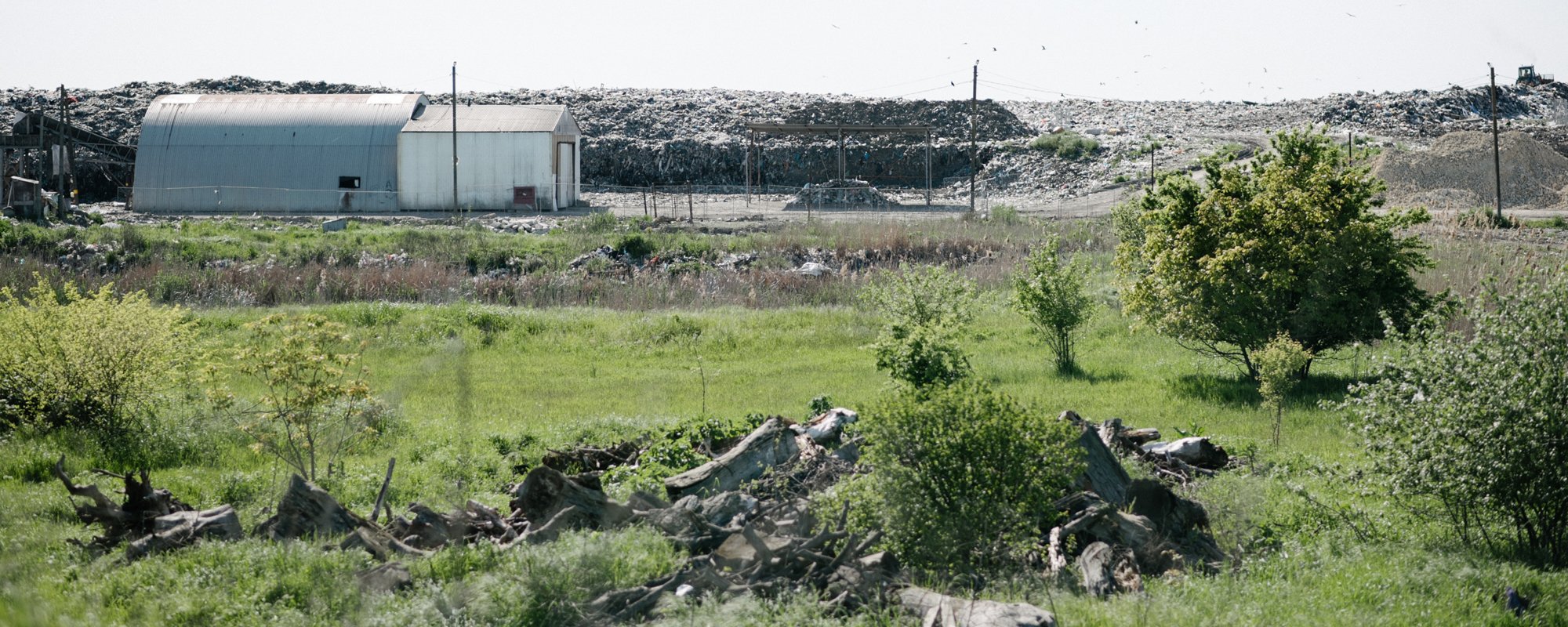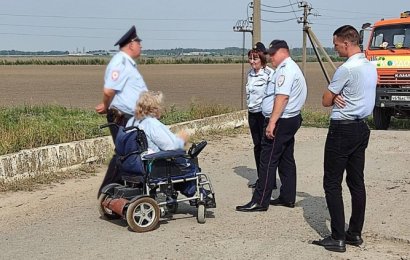The Krasnoarmeysky district of Kuban is responsible for 16% of the total amount of rice produced in all of Russia.
A part of this district is a village called Poltavskaya, where a huge polluting landfill that holds waste from all over the region is located right in the middle of rice fields.
OVD-Info together with the Novaya Vkladka tells the history of people protesting the landfill.
A landfill site surrounded by rice fields
Kuban, in the country’s southeast, is one of the most agricultural regions in Russia. The Krasnoarmeysky district of Kuban is responsible for a third of all rice grown in Kuban, 16 percent of all Russian rice.
The Poltavskaya village became known throughout the country in April 2023. Local residents had been blocking the road along Telman street for several days. People took turns to keep garbage trucks out. A truck eventually started going right through the crowd — literally. As a result, one elderly woman fell unconscious, while the rest of the protesters did not suffer serious injuries.
The police stood aside and blankly stared. The next day a man in a wheelchair went to the bridge leading to the landfill. He held a poster that read «Stop the garbage genocide» and demanded to speak with the local police authority. Finally, the head of the district, Yuri Vasin, met with him and only then was it possible to negotiate with the elderly activist.
The struggle against the landfill in the village has been going on for almost two years now. There was a small garbage dump in Poltavskaya even in Soviet times, but the limited garbage didn’t bother the locals too much. Everything changed in the fall of 2021, when the villagers found out that the waste from almost the entirety of the region would be brought there. Over a thousand people attended the first street protest that winter. A famous journalist was detained immediately when he came to Poltavskaya.
Natalia Goryaeva didn’t ever give a thought to the landfill in her native village up until November 2021. At that time, she was running her own business: her family owns the largest car repair shop in the area as well as several stores. Now she calls herself the leader of the protest — and other villagers agree with this.
We arranged an interview with Natalia in one of the buildings of her company. A courteous employee of the company meets us at the door, opens the massive wooden doors and leads us into the boss’s office. Natalya asks to wait a bit — she is talking on the phone, sitting in a massive leather chair. A large table in front of her is lined with flowers — Garyaeva had a birthday the day before.
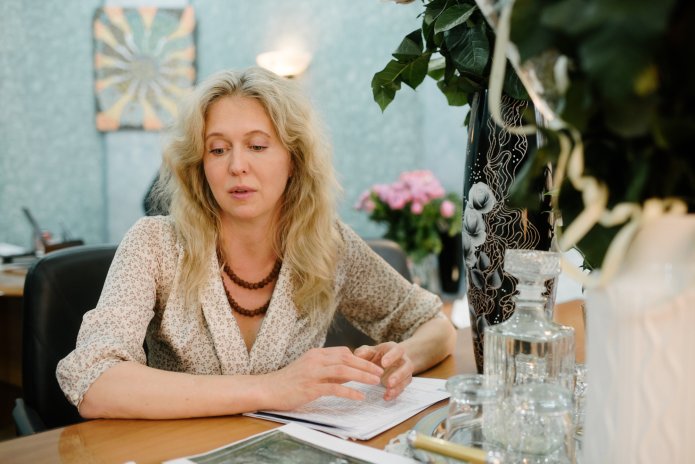
«I was living my life when the people who live closest to the dump started to panic: ‘That’s it! Catastrophe! You need to leave the village! ’ I considered myself apolitical, always busy. But when I found out about the scale of the problem, I actively joined the fight.»
Previously, waste from resort towns, including Tuapse and Sochi, was taken to another landfill in the middle of nowhere — Belorechensky (about 250 km from Sochi, Russia’s largest resort town). In 2021, authorities shut it down, as it was nearly double the capacity. Then a question arose before the Kuban authorities: where to bring tons of litter?
It was not possible to sign the almost 22 million dollars contract for the transportation of waste from Sochi — not a single application was submitted for the competition, not a single landfill in the region was ready to accept such volumes of waste. Then the regional Ministry of Fuel and Energy and Housing and Public Utilities reported in their social networks that they were considering setting up a landfill in the village of Poltavskaya.
Natalya says: no one officially warned the inhabitants of the village that their home would be the last stop for garbage from the resorts of Tuapse and Sochi. This became known only from documents leaked from a meeting of the interdepartmental commission. According to Garyaeva, the volume of waste brought to the village’s small dump would have increased by 5-6 times.
The fact is, says Natalya, that the authorities of the Krasnodar Territory considered the small dump in Poltava to be a municipal solid waste landfill. But if a dump is any, even a spontaneously created place where garbage is dumped, then only a specially equipped facility can be a landfill. For example, a landfill should have infrastructure for isolating waste with groundwater, collecting and filtering toxic effluents, and removing landfill gas.
What else differs a landfill from a dump (additional information)
The citizens of the Poltavskaya village, as Goryaeva reminds us, did not want to receive the waste from the wealthy Sochi and Tuapse, so they went to protest. As a result, the government decided not to pursue this idea, but they said that the litter from neighboring Krymsky and Slavyansky district must be taken to the village. Huge number of garbage trucks started to arrive in the village so the dump has turned into a huge foul-smelling landfill that poisons not only fertile rice-bearing soil, but also people’s lives.
How a soviet dump became a family business
Retiree Lyudmila Borisovna Grishkova’s house is located 500 meters from the landfill. She recalls that in 1989, when she moved to the village, there were only wastewater treatment facilities and a huge meadow near her house. A small local dump was right after it.
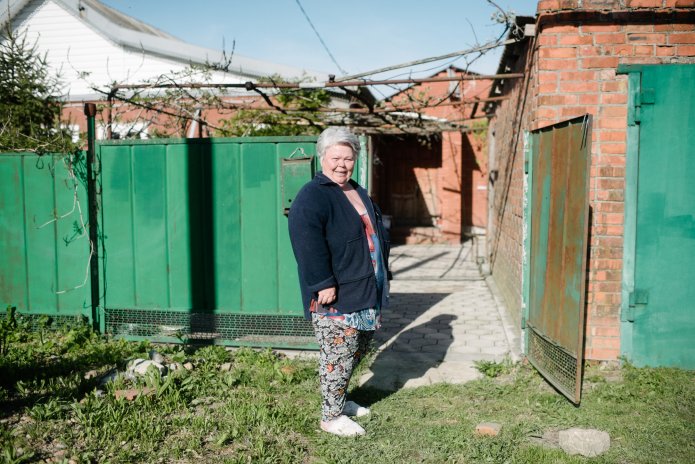
«Sometimes they would take there a hatching egg that did not hatch. Each village used to have its own dump. And now can you imagine that they take the garbage of the whole region here?» — recalls Lyudmila Borisovna. While we are having a conversation with her, garbage trucks are blasting past her house. Seeing a camera, one of the drivers flips us the bird.
The dump in the Poltavskaya village appeared in the 1980-s, according to another local, Valeriy. In the region, there used to be more than 150 places for waste dumping. Later, some of the biggest dumps got the license — since then they were considered as landfills.
Since the early 2000s, the village’s dump had been managed by the municipal enterprise «Housing and Utilities Services» of the Krasnoarmeisky district. In 2012, in the same district, an LLC was set up, with the confusing name of ME HUS (Multiprofile Enterprise Housing and Utilities Services). Its founders were Vladimir Vasin and Natalia Vakulenko, brother and daughter of Yury Vasin, the head of the district since 2011.
The municipal enterprise leased land to the freshly-minted LLC for a symbolic price of 69,000 rubles (US$ 830) per year for 10 hectares (the lease agreement is at the disposal of the editorial board). In 2013, the LLC received a license and the local landfill officially became an inter-municipal landfill.
According to Natalia Garyaeva, the landfill could not legally obtain the license because there are too many violations: no filtrate and biological gas collection systems and many other things. There is also an irrigation canal running along the border of the site, connected to the Sea of Azov. Water from this canal flows into rice fields. The Poltavskaya villagers believe that the founders of the new enterprise solved all issues with documents with the help of their relative — and district head, Yury Vasin.
The residents of the village are sure that the danger of the landfill is confirmed by the recent court proceedings initiated by the Federal Service for Surveillance on Consumer Rights Protection and Human Wellbeing and ME HUS LLC. The Federal Service conducted its own investigation and filed a claim against the company for damages. The decision of the regional arbitration court dated 17 March 2022 states that the mercury content in the soil adjacent to the landfill is 32 times higher and arsenic is twice as high. According to Garyaeva, this confirms that there is no leachate collection system in the landfill, which means that the owners could not legally obtain the license. But instead of closing the landfill, the arbitration court only recovered 774,000 rubles (US$ 9,300) from the ME HUS LLC for the damage caused to the environment.

For a long while, most of the villagers did not pay too much attention to the landfill. Only the residents of Telman Street (the nearest to the landfill) which is regularly driven by garbage trucks were indignant. At the end of Telman Street there is a flimsy bridge, and immediately behind it there is a checkpoint, about 400 meters from the last house to the landfill.
However, before that, all garbage trucks travel eight kilometers along the village streets. They mostly follow a narrow gravel road, with houses on one side and a river on the other. Some old adobe houses have cracked due to constant vibrations, residents say.
What made the situation different is that prior to 2021 only two cars a day drove to the landfill at most. Since April 2021, this number has increased manifold. During that time, the landfill became a property of Moscow businessman Alexander Viktorovich Markov, with the Moscow LLC «Ecotechprom» as the general investor. From the info given by the service «Contour. Focus», the company is associated with Galion LLC, the sole founder of which is Andrey Polovinkin. It is he that Poltava residents consider «the key head of the landfill.» The journalist of the Novaya Vkladka couldn’t reach Polovinkin for a comment. It should be noted that in 2022 the loss of his company exceeded 33 million rubles (US$ 390 000).
«Question: what did Polovinkin pay that much for? Is it really that much land? It’s city property, it has been up for rent dirt cheap for 49 years. No special technologies at all, it’s just damp earth.» — Natalia recounts. She’s convinced that the new owner was counting on accepting waste from the whole region to make money on it. But nothing went according to plan, thanks to the bravery of Natalia and her comrades.
Pay up or die
When the landfill got into Moscow businessmen’s hands and became rapidly expanding, the «Poltavskaya against the landfill» movement formed in the village.
The villagers, led by Natalia Garyaeva, attended pickets and rallies, blocked roads, organized community gatherings, wrote appeals to all authorities, and appealed to environmentalists for expertise. So, in January 2022, Vladimir Antonov, a lawyer, and employee of the «EkoKonsalt» LLC, concluded that there was no appropriate sanitary zone at the landfill in Poltava and it was impossible to equip it. Legally, a landfill cannot function without a sanitary zone at all.
During the summer of 2022, a disabled elderly man, Yuri Trubachev, the father of Natalia Garyaeva, went to the bridge leading to the landfill for the first time with the «Stop the garbage genocide» poster. The man did not allow garbage trucks to pass by and immediately got into all the regional media. After that the landfill was noticed by the head of the Russian Federal Service for Supervision of Consumer Rights Protection and Human Welfare Svetlana Radionova. She pointed out excessive levels of pollutants in the wastewater. The prosecutor’s office representatives visited Poltavskaya, but that was the end of it.
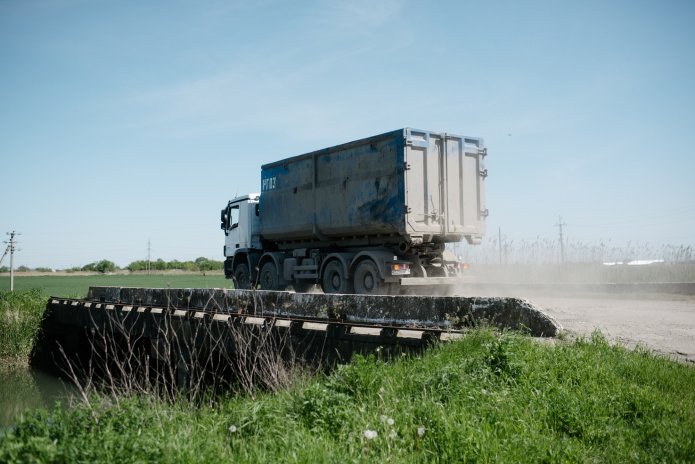
In September of 2022 other villagers appeared on the bridge, affectionately nicknamed by the locals «Uncle Yura’s bridge». The protest ended with several protocols and a promise from the local authorities to go to court with a lawsuit to force the Krasnoarmeysky district housing and utilities company to close the landfill. But in November, the Krai Court of Arbitration refused the administration. From the very beginning the locals had been saying that this would happen.
At the end of 2022, the authorities of the Krasnoarmeisky district organized a meeting with the villagers, attended by more than a thousand dissatisfied people. At this public rally, the first deputy head of the district, Nikolai Shumchenko, called the gathering an «aggressive minority, » to which the crowd responded by yelling «disgrace.»
Where have you been for the last thirty years?
When the landfill became a troubling matter, the prior indifference of the people became the trump card of the regional authorities. Their answer to all the indignations is: «You have been tolerating it for 30 years, so you will tolerate it now».
The year 2023 started with another statement of Kuban governor Veniamin Kondratiev. According to him, no one will close the landfill «without good reason». First of all, they have already invested money in it. Secondly, the landfill has been working for thirty years. Thirdly, the investor Ekotehprom invested 50 million rubles into the landfill and is planning to build there a full operation complex with recycling for 2.4 billion rubles (US$ 27 000 000). Anyway, the landfill is «only 40% full», says the governor.
Every now and then the residents of Poltavskaya keep reminding that the landfill is not 30 years old — it only appeared in 2013. But the authorities do not hear them. «They keep telling us: why didn’t you say anything for the last 30 years? And you know what packaging was like 30 years back. They would wrap herring in a paper bag, and that’s it. And now, if it is a herring, then it’s five bags. And how many people have moved here…» Lyudmila Borisovna complains.
In early 2023, a police statement was filed against the organizer of the protests, Natalya Garyaeva. Allegedly, she paid 350 thousand rubles (US $4 150) to Sergey Sigaev, a previously convicted resident of Tomsk, to eliminate the head of the district, Yuri Vasin, and blow up the bridge leading to the landfill. The statement was written by Sigaev himself, who had been previously arrested for 14 days for hooliganism.
«He used to work in my husband’s company, but he didn’t fit in because of his antisocial behavior that included heavy drinking and getting into fights, » explains Natalya. She assumes that the police pressured Sigaev while he was under arrest: «Either you write a denunciation or you’ll face a sentence.»
Immediately after being released from custody, Sigaev flew back to Tomsk, while Natalya Garyaeva was summoned for questioning. She filed a counter-statement of defamation and knowingly false denunciation, and as a result, both cases were put on hold. The police’s refusal to initiate a case against Sigaev stated that he «does not want to come to the local police station and asked not to be bothered» (the document is available to the editorial staff). Interestingly, the regional Ministry of Internal Affairs' press office initially stated that no statements against Natalya Garyaeva had been registered at all, but later reported the refusal to initiate a case (as reported by Novaya Vkladka). The police are not providing any further comments on this matter.
This spring, a few days after the blockade on Telmana Street, searches were conducted at Natalya’s company, «Kamavtoresurs.» And when more than 20 villagers tried to come to the governor office to meet the governor in person, the rented bus was stopped in a neighboring village and not allowed to proceed. People had to walk some distance along the highway before calling a taxi to reach Krasnodar because no taxi driver wanted to pick up passengers any closer to the road patrol post. By the way, they didn’t manage to meet the governor at all. He was in Sochi at the time.
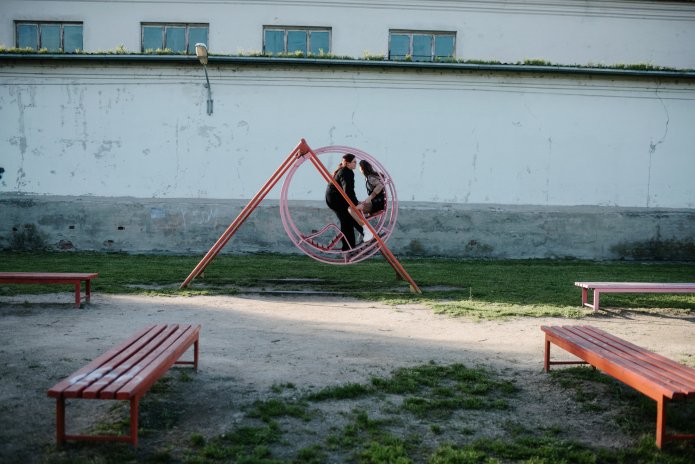
After two years of struggle, the residents of Poltavskaya have not moved an inch closer to resolving their problem. Natalya mentioned that during this time, she accumulated several boxes with responses of various authorities. The result is only dozens of promises from administrations and different institutions. There have been no real actions taken so far.
For example, krai’s authorities promised to build a road bypassing Poltavskaya from the very beginning of protests. They still haven’t even begun planning. Plus, there must be a bridge above the canal to build that road, and the cost of bridge construction is hundreds of thousands of dollars. Locals are concerned that an investor will not be interested in paying for it. But they are planning to protest further anyway — people want to shut down the waste landfill completely.
In May, the first deputy of the region’s prosecutor visited the village. He drove along the entire route of the garbage truck — the next day all the gravel roads were straightened over. Now the villagers are waiting to meet governor Kondratiev. At least, that was the promise made by the authorities after the scandal with the stopped bus.
A protesting village
Natalya Garyaeva was born in Cherepovets, in Russia’s northwest, but in the 90s she moved with her parents to Kuban and has been living in Poltavskaya for 25 years. Almost all her life she worked here in the family business — as an accountant at first, and now, after the death of her first husband Andrei Garyaev, as a general manager.
Garyaeva has three children. The woman gave birth to the last, from her second marriage, at the age of 42, therefore, she says, she has no time to be bored. By evening, Natalya is usually so tired that she doesn’t even have enough strength to have some quality time with children.
Natalia bought her house with her husband Andrey many years ago. They built it literally bit by bit. Now there is a vegetable garden and many trees — plane trees, pines, spruces, maples. Natalia cannot imagine her life without nature and loves to walk barefoot in her yard.
When the residents of Poltavskaya protested against the landfill, her first husband, Andrey Garyaev, dissuaded Natalya from participating in the protests. «There is a lot of money and politics around the landfill, » he said, «and too much activism could make us lose our business.» But Natalya was adamant: she wants to stay in the village, and the dump will interfere. Her husband supported her then and even began to help her to organize protests.
Andrey had been severely ill in his last years. He committed suicide last October. Natalia is sure that the Andrey’s condition was affected, among other things, by the confrontation around the dump and litigation around the family business — the authorities accused Garyaev of delay in building a martial arts center in the city of Abinsk.
But Natalia, as well as other residents of Poltavskaya, is not going to give up. On May 26, they blocked the road to the dumpster once again. Several people were detained quite harshly by fixing on the pavement. One elderly was dragged into the car by the security forces by his arms and legs. In response to the use of force, the villagers appealed to the Investigative Committee with a statement against the police. And a few days later, Poltavskaya residents filed another appeal to the district prosecutor’s office because of the construction on the territory of the landfill.
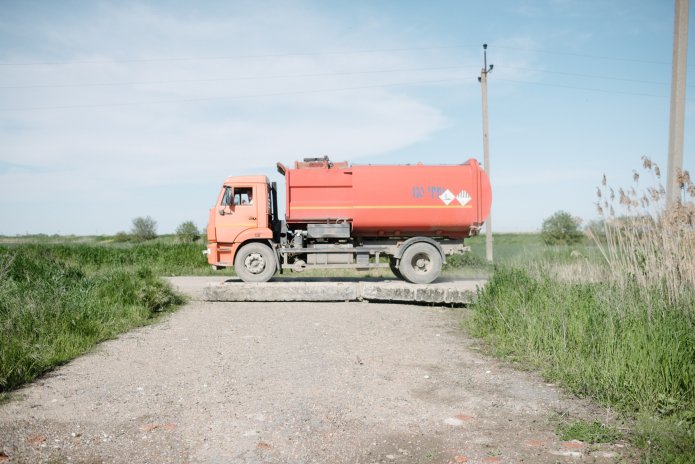
The villagers do not talk about their plans for the future. They say they will act according to the situation, but they definitely will not stop. In their telegram channel (telegram is a popular messenger in Russia) «Poltavskaya against landfill» local residents proudly write that they live in a village with a long protest history. Natalia explains: the village, named after the Ukrainian city of Poltava, was created by the Black Sea Cossacks at the end of the 18th century. Over the past 150 years, the authorities — both Tsarist and Soviet — have suppressed the uprisings of the Poltavskaya Cossacks several times.
The largest, known as the «women’s riot», occurred in 1930. The village women came to the market square protesting against the collective farm policy. Three thousand people joined the riot which led to deportations of some families to the far north. Two years later almost the entire population of Poltavskaya was put into cattle cars and taken to the Urals — for failure to fulfill grain procurement plans. Instead of the native Cossacks, the village was populated by demobilized Red Army soldiers from central Russia and Belarus, who had never worked on the land. At the same time, Poltavskaya was renamed into Red Army village, and the former name was returned only in the 1990s — after the demands of the locals.
Natalya remembers how she grew up with the songs of a famous Soviet poet and musician Vladimir Vysotsky. When the landfill problems began in the village, the lines came to her mind:
«If you idly watched from above, and if you hadn’t joined the struggle against the scoundrel, the lyncher, means that in life you were you did nothing.»
Since then Garayeva has been feeling responsible for the villagers who trusted her. The woman says that there were several government officials and even some policemen on their side, though they were afraid to be frank about it. Natalya believes that Poltavskaya’s villagers will be able to obtain justice and close the landfill.
«Sometimes I am afraid for my life, but I cannot just sit, be quiet and stay back», — Garyaeva says. «I was entrusted by the people, and there is no way back for me. I am even ready to lose all I have. But if it continues, the people would just go and sit on the bridge. They may kill us, run us over with trucks again, but it is impossible to live like that.»
Valeria Shustval



